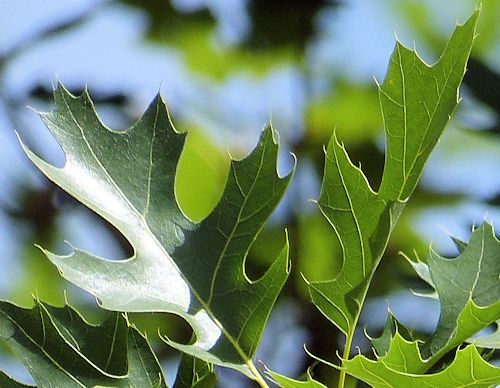Growing Quercus buckleyi:
Texas Red Oak
Back to Trees and Palms
Description
Form: Tree.
Leaf retention: Deciduous.
Growth rate: Slow when young to moderate when established.
Mature Size: 30-50' (9-15m) high and wide in hot, dry climates.
Flowers: Separate male and female catkins on the same tree.
Bloom: Spring.
Fruit: A small brown striped acorn 0.5-0.75" (12-18mm) long that matures in the fall 18 months after pollination.
Leaves: Green, deeply divided into 5-9 lobes, usually 7. The leaves turn reddish in late fall or early winter. This tree provides moderate shade.
Stems: New stems are reddish, aging to gray, woody.
Roots: Tap root.
Wildlife: The acorns attract small mammals.
Toxic / Danger: The leaves and acorns are toxic.
Origin: Kansas, Oklahoma, Texas, Mexico.
Form: Tree.
Leaf retention: Deciduous.
Growth rate: Slow when young to moderate when established.
Mature Size: 30-50' (9-15m) high and wide in hot, dry climates.
Flowers: Separate male and female catkins on the same tree.
Bloom: Spring.
Fruit: A small brown striped acorn 0.5-0.75" (12-18mm) long that matures in the fall 18 months after pollination.
Leaves: Green, deeply divided into 5-9 lobes, usually 7. The leaves turn reddish in late fall or early winter. This tree provides moderate shade.
Stems: New stems are reddish, aging to gray, woody.
Roots: Tap root.
Wildlife: The acorns attract small mammals.
Toxic / Danger: The leaves and acorns are toxic.
Origin: Kansas, Oklahoma, Texas, Mexico.
Cultivation and Uses
USDA hardiness zones: 6-11.
Heat tolerant: Yes, but this plant may experience leaf burn over 110°F (43°C) unless given extra water.
Drought tolerant: Yes.
Sun: Full sun.
Soil: Well draining, dry, low in organic content, pH 6.1-8.5 (slightly acidic to alkaline).
Water after becoming established: Deep water once a month, except two to four times a month in temperatures over 110°F (43°C). This plant tolerates flood irrigation.
Mulch: Unnecessary.
Prune: Trim to shape and to remove the lowest limbs.
Litter: Leaves in fall.
Propagation: Seed, which must be cold stratified.
Uses: Ornamental.
USDA hardiness zones: 6-11.
Heat tolerant: Yes, but this plant may experience leaf burn over 110°F (43°C) unless given extra water.
Drought tolerant: Yes.
Sun: Full sun.
Soil: Well draining, dry, low in organic content, pH 6.1-8.5 (slightly acidic to alkaline).
Water after becoming established: Deep water once a month, except two to four times a month in temperatures over 110°F (43°C). This plant tolerates flood irrigation.
Mulch: Unnecessary.
Prune: Trim to shape and to remove the lowest limbs.
Litter: Leaves in fall.
Propagation: Seed, which must be cold stratified.
Uses: Ornamental.
Comments
This plant is a member of the Beech and Oak family (Fagaceae). It is closely related to Shumard Oak and the two are able to cross pollinate.
Do you have additional information or a different experience for these plants that you would like to share? Email info@GardenOracle.com. All contributions are welcome and appreciated.
This plant is a member of the Beech and Oak family (Fagaceae). It is closely related to Shumard Oak and the two are able to cross pollinate.
Do you have additional information or a different experience for these plants that you would like to share? Email info@GardenOracle.com. All contributions are welcome and appreciated.





Latest update: February, 2019
© 2008-2026 by GardenOracle.com

